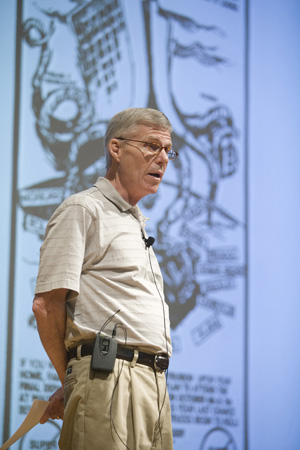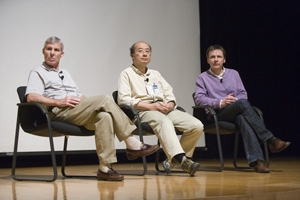| Monday, October 29, 2007 |
| Subscribe | Contact Fermilab Today | Archive | Classifieds |
Early, open communication highlighted for ILC sites
Craig Jones once debated egging DOE buses in the area for a talk about a proposed giant high-energy physics experiment in Illinois in the late 1980s. He led an opposition group bent on stopping the Fermilab's bid to build the Superconducting Super Collider. "The mantra: 'You people don't matter. Only the physical characteristics of the site matter.' I can't tell you how often I heard that," Jones told a crowd of about 200 Wednesday at Fermilab as part of the ALCPG07 conference. In the end, Texas won the bid to host the SSC. Now, Jones, a Campton Township resident and member of Fermilab's ILC Citizens' Task Force, is advising the laboratory on how to avoid the same pitfalls with the ILC. "The difference between then and now is openness," he said. In preparation for picking a nation and community to host the ILC, scientists want to examine what has worked and what hasn't for past large-scale research projects. Christian Mrotzek, of DESY in Germany, and Nobu Toge, of KEK in Japan, offered insight to ALCPG07 members and echoed Jones's call for connecting with the neighbors. The speakers stressed the importance of reaching out to potential ILC neighbors as early as possible. DESY provided a case study in the value of early communication. In preparation for the TESLA project, DESY staff began communicating with neighbors in 15 communities about six years in advance of the expected formal project approval. A TESLA research campus would have occupied the center of Ellerhoop, and the small town's residents were wary. But through strong communication, they grew to embrace the plan, Mrotzek said, and were disappointed when the TESLA project was scrapped in 2003 for the XFEL project. The quick shift left DESY staff with little time to consult with XFEL neighbors. The result was pickets and protests. "We will really need to talk to our neighbors at the ILC, probably at every possible site," Mrotzek said. Fermilab has begun that process with the creation of an ILC Citizens' Task Force of neighboring residents, to advise Fermilab on potential concerns from the community. KEK in Japan offers neighbors monthly laboratory open houses to build trust and generate enthusiasm for science goals. Outreach should go beyond explaining the scientific goals, though, the speakers said. Participation in local school programs, opening laboratories to the public and encouraging scientists to participate in local social and political events can make the neighboring communities feel invested in the laboratories' future. When KEK replaced a forest torn down during construction of J-PARC the laboratory invited residents to join in the tree planting. The failed SSC venture lacked that friendliness. "(With the SSC) there was a complete lack of trust," Jones said. "Because of that, productive dialogue was out of the question. We were at total war." Jones told the ILC community it is their job to reach out to neighbors and not wait for questions."The ball is in your court," he said. --Tona Kunz View streaming video of the colloquim here. |

